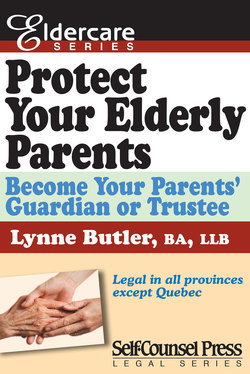Читать книгу Protect Your Elderly Parents - Lynne Butler - Страница 6
На сайте Литреса книга снята с продажи.
Table 1: Name of Person in Need of Assistance by Province and Territory
ОглавлениеYou will note that in most cases, the terms used to describe an adult who needs assistance with decision making refer to the concept of being incapable or incapacitated. As more and more parts of Canada modernize their laws dealing with assisting incapacitated adults, the language used in those laws also becomes more up-to-date. By and large, Canada has done away with language that referred to incapacitated adults in somewhat derogatory terms, though one or two provinces have yet to reform their laws. The modern-day laws recognize that adults who are losing or have lost their capacity should be treated with respect and dignity.
Guardianship and trusteeship should not be undertaken lightly. Keep in mind that Canada’s Charter of Rights ensures each person the right to life, liberty, and security of the person. You must understand that by asking a court to appoint you as someone else’s guardian or trustee, you are asking it to take away another person’s right to run his or her own affairs. For this reason, you are encouraged to ask the court only for the powers you need to assist the dependent adult, and no more. Asking for more is at best interference and at worst, an infringement on another person’s rights.
The general attitude that you should take when considering guardianship and trusteeship is that dependent adults should be encouraged to remain as independent as possible for as long as safely possible. Only the help that is requested or needed by a dependent adult should be given. Taking away an individual’s independence can be an indignity to the person that is in some cases avoidable. Some elderly people feel angry and violated if unwanted assistance is imposed on them by well-intentioned family members who have too heavy a hand. Guardians and trustees should tread as lightly as possible while giving the assistance that is needed.
Guardianship and trusteeship laws were created for one purpose only, which is to assist a dependent adult. All of the provincial and territorial statutes give the courts the discretion to appoint a guardian and trustee if the court believes it to be beneficial to the dependent adult.
Provincial and territorial legislatures are also doing away with laws that allow a guardian or trustee to have absolute and full control of a person and his or her health care and finances once incapacity has been shown. The more forward-thinking provinces and territories recognize that individuals suffering from loss of capacity do not necessarily need every single area of responsibility taken from them. This is where the difference between guardianship and trusteeship comes in. It is simply a matter of time until all areas of Canada are fully modernized in this way.
